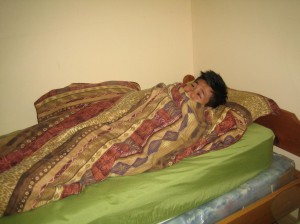The presence of fever typically indicates that there is some sort of illness present in the body. Unless the body temperature goes up or surpasses more than 103 degrees F, it is not a cause for concern. Once an individual has a body temperature this high, treatment is a must. If there are other severe symptoms that go along with the high fever, the individual must be given medical care especially if the treatment measures to reduce the fever have no effect.
http://youtu.be/Gj6kpUFw4Og
Cold beverages
Always bear in mind that fever can lead to fluid loss and dehydration. The individual should drink beverages in order to minimize the risk for these complications. Cold drinks can help reduce the body temperature. Good examples include cold juice, ice water and even sports drinks since they help replenish and cool the body. If you want to learn how to effectively manage high fever, click here.

Being still
Engaging in activities such as playing, running or even walking can cause an increase in the body temperature. It is best to encourage the individual to diminish physical action until the fever has started to reduce. It is also recommended to keep the room temperature at around 70 degrees F. Take note that this temperature is not warm enough to cause a spike in the body temperature and not cool enough to cause chills if it occurs along with fever.
Staying uncovered
Always bear in mind that fever is often accompanied by chills. Adding on blankets can lead to an increase in the body temperature and must be avoided. When needed, blankets can be utilized to provide warmth for the chills but they must be removed as soon as the symptoms subside. The individual should dress lightly and cover the body using only light sheets since these are better for regulating the body temperature.
Tepid bath
The individual should soak in a lukewarm bath for 5-10 minutes at a time. This can be unpleasant but highly effective in lowering the body temperature rapidly. Bath water that is cool can cause shivering. The water must feel slightly warm but not too warm as normally would. In case the water causes shivering, the body temperature can likely increase. The bath must be repeated every few hours or as soon as the body temperature increases. An alternate method to a full bath is to apply a sponge with lukewarm water onto the body or apply a wet cloth on the forehead, chest and back of the neck.
Medications to reduce the fever
It is recommended to use an over-the-counter medication for fever if other methods to reduce the temperature fail to work. Ibuprofen or acetaminophen is highly effective choices but aspirin must be avoided particularly among children due to the risk of Reye’s syndrome since the disease can lead to death.
